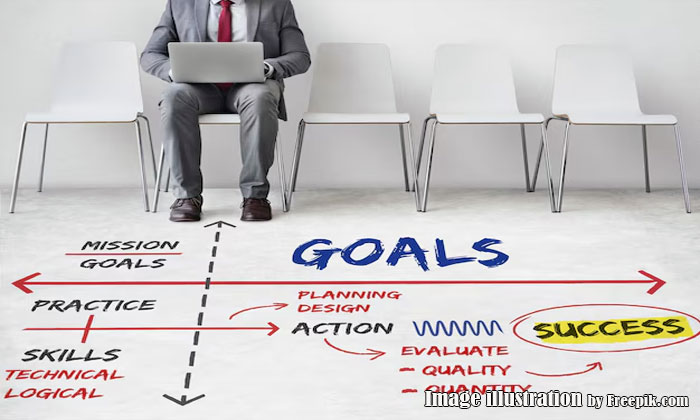
Mapping out career goals is a critical step in ensuring a successful and fulfilling professional journey. Whether you’re just starting your career or looking to realign your path, having the right tools can make all the difference. These tools provide structure, guidance, and support as you plan, track, and achieve your career objectives. Below are some of the top tools you can use to map out your career goals effectively.
1. SMART Goals Framework
The SMART framework is one of the most popular tools for setting career goals. It helps you craft clear, measurable, and actionable objectives. SMART stands for:
- Specific: Your goal should be clear and precise, answering the who, what, where, and why.
- Measurable: Define how you will track your progress, whether through numbers, milestones, or key performance indicators (KPIs).
- Achievable: Set realistic goals that challenge you without being unattainable.
- Relevant: Ensure the goal aligns with your broader career aspirations and values.
- Time-bound: Set a clear deadline or timeframe to achieve your goal.
By using the SMART framework, you can break down large, overwhelming career objectives into smaller, actionable tasks that are easier to manage and track.
2. Career Development Plan (CDP) Template
A Career Development Plan is a document where you can outline your short-term and long-term career goals, as well as the steps you need to take to reach them. Many free templates are available online, which guide you through various sections, including:
- Personal assessment: Understanding your skills, strengths, and weaknesses.
- Goal setting: Defining both short-term and long-term goals.
- Action steps: Identifying what needs to be done to achieve those goals, such as gaining certain qualifications or attending networking events.
- Timeline: Setting deadlines for each goal and step.
Using a Career Development Plan provides clarity on where you are, where you want to be, and how to get there. It’s a valuable tool for both self-reflection and accountability.
3. Mind Mapping Tools (e.g., MindMeister, XMind)
Mind mapping is a visual tool that helps you organize and connect your thoughts. When it comes to career planning, mind mapping allows you to visually brainstorm different career paths, opportunities, and the necessary steps to reach your goals. It’s a great tool for:
- Exploring different career options: Map out various career paths based on your interests, strengths, and experiences.
- Connecting goals to action items: Break down large career goals into smaller, manageable tasks and organize them in a way that shows how they interconnect.
- Creative thinking: It allows for free association and brainstorming, which can lead to new insights or ideas that you hadn’t considered.
Tools like MindMeister and XMind make the process of mind mapping more efficient and visually engaging, giving you an overview of your career goals and how to achieve them.
4. Trello or Asana (Project Management Tools)
While typically used for project management, tools like Trello and Asana are excellent for organizing career goals and tasks. These tools allow you to:
- Create boards or lists: Organize your goals into categories, such as “Short-Term Goals,” “Skills to Develop,” or “Networking Opportunities.”
- Set deadlines: Assign due dates to specific tasks and monitor your progress.
- Collaborate with others: Share your boards with mentors, colleagues, or career coaches to get feedback and accountability.
- Track progress: These tools enable you to track your progress and ensure that you’re moving toward your goals in an organized and timely manner.
Trello’s visual layout and Asana’s task-oriented features make it easy to track all aspects of your career goals in one place, increasing both efficiency and motivation.
5. LinkedIn (for Networking and Professional Branding)
LinkedIn is more than just a social platform—it’s an essential tool for career planning, goal setting, and networking. Here’s how you can use LinkedIn to map out your career goals:
- Profile optimization: Regularly update your LinkedIn profile with new skills, accomplishments, and career milestones.
- Goal tracking: Use LinkedIn’s “Career Interests” feature to indicate your professional goals and receive personalized recommendations for job opportunities, courses, and networking connections.
- Networking: Connect with professionals in your industry, join relevant groups, and follow companies that align with your career goals to stay informed and expand your network.
- Skill development: LinkedIn Learning offers online courses that can help you acquire new skills relevant to your career goals.
LinkedIn serves as a comprehensive tool to track your professional progress, identify growth opportunities, and stay engaged with your career development.
Also read other self development articles on Destyless:
6. Google Calendar (for Time Management)
Effective time management is essential when working toward career goals. Google Calendar is a free, easy-to-use tool for organizing your daily, weekly, and monthly schedule. Here’s how to use it for career planning:
- Schedule goal-related tasks: Set reminders for key tasks such as completing courses, updating your resume, or networking.
- Block time for career development: Dedicate specific blocks of time to activities related to your career goals, such as skill-building or job searching.
- Set deadlines: Use Google Calendar’s reminder system to ensure you’re staying on track with time-sensitive goals.
- Track progress: Review your calendar at the end of each week or month to assess whether you’re moving toward your objectives.
By integrating career development activities into your calendar, you ensure that your goals remain a priority and that you’re consistently making progress.
7. StrengthsFinder Assessment (by Gallup)
The StrengthsFinder assessment, developed by Gallup, helps individuals identify their unique strengths and talents. Knowing your strengths is essential when mapping out your career goals because it enables you to:
- Choose a career path that aligns with your natural abilities: Whether you’re naturally inclined toward leadership, communication, analytical thinking, or creativity, knowing your strengths helps you target a career where you’ll thrive.
- Set strengths-based goals: Once you’ve identified your strengths, you can set specific goals related to enhancing and applying those strengths in your job.
- Increase self-awareness: Understanding your strengths and how they influence your work style and behavior helps you set more realistic and fulfilling goals.
The StrengthsFinder assessment is an effective tool for creating a career plan based on your natural abilities, leading to greater career satisfaction and success.
8. Career Coaching and Mentorship
While digital tools are essential for career planning, sometimes the most valuable resource is human guidance. Career coaches and mentors provide personalized advice and insight that can help you fine-tune your career goals. They can help you:
- Identify your strengths and weaknesses: A mentor or coach can offer feedback on areas where you can improve or grow.
- Set realistic and achievable goals: With their experience, they can help you define career goals that are challenging yet attainable.
- Stay accountable: Regular check-ins with a mentor or coach provide accountability and encouragement as you work toward your goals.
Finding the right mentor or career coach can give you the guidance and perspective needed to navigate your career path effectively.
9. Career Assessment Tools (e.g., O*NET, Myers-Briggs)
Career assessment tools such as O*NET or the Myers-Briggs Type Indicator (MBTI) provide valuable insights into your personality, strengths, and ideal work environments. These assessments can help you:
- Identify your ideal career path: Based on your interests, values, and personality traits, these tools suggest career paths that would suit you best.
- Discover potential strengths: They offer a deeper understanding of your capabilities and how they apply to different roles.
- Guide goal setting: Knowing what careers align with your personality helps you set more specific and relevant goals.
Using career assessment tools is an effective way to gather information and make more informed decisions about your professional development.
Conclusion
Mapping out career goals is a process that requires introspection, planning, and consistent effort. Utilizing the right tools can make this process easier, more organized, and more effective. Whether it’s using frameworks like SMART goals, mapping tools like Trello, or relying on career assessments and mentorship, these tools can help you clarify your goals, stay motivated, and ultimately achieve success in your career. The key is to take action and make these tools work for you in a way that aligns with your aspirations.






